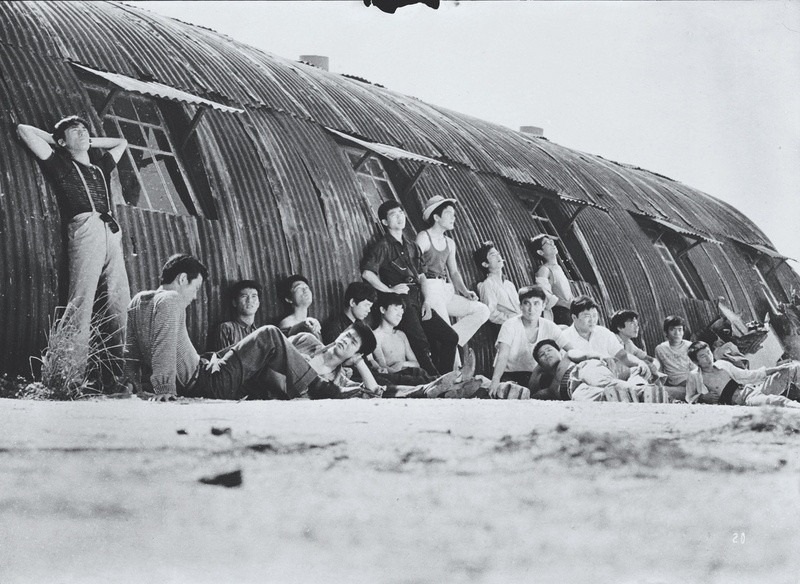
Shochiku Nouvelle Vague 2007 / Arashi wo yobu juhachinin / Japan 1963
A drama about a clash between a responsible lodging house caretaker and a collective protagonist in the form of a pack of adolescents. Shipyard worker Shimazaki gets an offer of free lodging from his employer in the company seaside rest house if he agrees to see to its running. As Shimazaki soon finds out, it will mean seeing to his housemates as well...


A drama about a clash between a responsible lodging house caretaker and a collective protagonist in the form of a pack of adolescents. Experienced shipyard worker Shimazaki gets an offer of free lodging from his employer in the company seaside rest house if he agrees to see to its running. After moving in, Shimazaki finds out that this will also mean taking care of a flock of youngsters, and he soon becomes their none-too-successful warden. At work the boys are disciplined, as soon as they return to their dormitory however they turn into an unmanageable mob. The frustrated caretaker is ready to give up on them but is kept there by the lovely Nobu, the daughter of the barman at his regular evening spot. After taking a trip to the city together and painting the town red, one of the unidentified youngsters rapes Nobu at the dormitory. Not wanting to have to bear the pressure from those around her, the shocked girl moves to another city. Shimazaki doesn’t manage to find out who the culprit is, but he is firmly decided on bringing Nobu back and showing her just how much he cares...
108 min / Black & white, 35 mm
Director Yoshishige (Kiju) Yoshida
/ Screenplay Yoshishige Yoshida
/ Dir. of Photography Toichiro Narushima
/ Music Hikaru Hayashi
/ Editor Kazuo Ohta
/ Producer Masaya Araki
/ Production Shochiku
/ Cast Tamotsu Hayakawa, Yoshiko Kayama, Eiji Matsui, Takenobu Wakamoto, Katsuyoshi Nishimura
/ Contact Shochiku Co., Ltd., The Japan Foundation

Yoshishige (Kiju) Yoshida (b. 1933, Fukui), the least conspicuous artist of the Japanese New Wave, studied French at Tokyo University, and the influence of French cinematography was distinctly evident in his pictures. In 1955, he won a competition to become a director’s assistant, and graduated from the school of the renowned director Kinoshita, like his predecessor Masaki Kobayashi. When the Shochiku studio decided to give young directors a chance, Yoshida found himself, along with Oshima and Shinoda, at the epicentre of events. His films dealing with alienation and isolation and pervaded by sex and senseless violence, however, soon deprived him of the goodwill of the studio’s chiefs. In 1964 he set up his own independent production company, which created one of the milestones of Japanese cinematography at the turn of the 1960s – the controversial and multilayered Eros Plus Massacre (Erosu purasu gyakusatsu, 1969).
Shochiku Co., Ltd.
4-1-1 Tsukiji, Togeki Bldg. 12th Floor, Chuo-Ku, 104 8422, Tokyo
Japan
Phone: +81 355 501 623
Fax: +81 355 501 654
E-mail: [email protected]
The Japan Foundation
4-16-3 Yotsuya, Shinjuku-ku, 160-0004, Tokyo
Japan
Phone: +81 355 623 535
Fax: +81 355 623 500
E-mail: [email protected]

Junko Kawaguchi

Marie Suzuki
Institution
First-hand brews throughout the year.
Be among the first to learn about upcoming events and other news. We only send the newsletter when we have something to say.